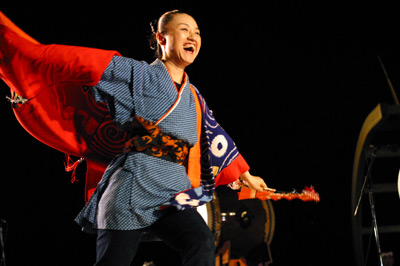MEDIA RELEASE
February 12, 2007
FOR IMMEDIATE RELEASE
HUMAN RIGHTS MUSEUM GETS BOOST FROM JAPANESE CANADIANS
Fundraising concert showcases culture from resilient community
Winnipeg, MB – The proposed Canadian Museum for Human Rights is getting a fundraising boost from a community that knows first-hand the fragility of freedoms and democracy. “
kibõ: Our Hope, Our Future,” a concert featuring artists from Canada, the U.S. and Japan, takes place at Winnipeg’s Pantages Playhouse Theatre, Saturday, February 24, 2007 at 8:00pm.
kibõ is a celebration of Nikkei (Japanese-Canadian) arts and culture, and a snapshot of a community that overcame enormous hardships to win dignity, prosperity and recognition for its rightful place in Canadian society.
The concert is headlined by Canada’s best known taiko group
Hinode Taiko, the
Aurora Odori dance ensemble, pianist
Michael Oike, and vocalists
Shayna Paulicelli and
Brent Hirose. They will be joined by guest artists
Chieko Kojima (principal dancer of Japan’s world-renowned taiko group
Kodo),
Kaoru Watanabe (
Kodo drummer and flute player) and
Shoji Kameda (composer-performer from
On Ensemble, Los Angeles). The performance also features world premieres of both solo repertoire and unique collaborative works. All proceeds from the event will go to support the Canadian Museum for Human Rights.
“Japanese-Canadians across the country realize the significance of human rights from our own history, which is why we believe supporting this museum is so important,” says Geoff Miki, president of the Manitoba Japanese Canadian Citizens’ Association (MJCCA), which is sponsoring the
kibõ concert with the support of the National Association of Japanese Canadians (NAJC) and the Manitoba Japanese Canadian Cultural Centre (MJCCC). “People need to know that even in Canada, you can’t take human rights for granted.”
The spread of cross-cultural understanding and appreciation of Nikkei culture that is at the heart of
kibõ goes beyond the performers onstage. Six Winnipeg schools are adding their support to
kibõ through a unique origami project. Students at Miles Macdonell Collegiate, Sisler High School, Dr. D.W. Hamilton Elementary, Oakbank Elementary, Harold Hatcher Elementary and Laidlaw Elementary will participate in creating thousands of folded paper cranes, a symbol of peace and reconciliation. Students will sign each crane that they fold, and the cranes will be hung at the concert in two 1,000 crane "mobiles". After the concert, the cranes will be sent to Hiroshima, where they will be placed in the Peace Park.
“A museum dedicated to human rights is an idea whose time has come,” according to Pamela Okano, chair of the
kibõ organizing committee. “We’re presenting an evening of incredible performances, not just to give people something to enjoy in the moment, but to help make that idea of a museum into a fact – something that will benefit future generations of Canadians, whatever their ethnic background.”
Ninety-nine percent of the Japanese-Canadian community in Manitoba is here as a direct result of the Canadian government’s policy of forced relocation from the West Coast during World War II. Canadians of Japanese ancestry, whose property had been seized by the government during the war, were still prevented from moving freely and banned from voting or political organizing until the War Measures Act was repealed in 1949.
Despite this unhappy start, Japanese-Canadians who came to Manitoba created a close-knit community that took root and prospered. The MJCCA, formed illegally in 1942, was committed to ensuring fair treatment for Japanese-Canadians and encouraging the development of cultural activities and social events to preserve Japanese heritage. That
kibõ can present Manitoba-based ensembles of international stature today is due to an emphasis on culture instilled by past generations of Japanese-Canadians who arrived on the bleak prairies with little beyond the clothing they carried.
Tickets for
kibõ cost $35 and $50 (plus GST and agency fees) and are now available at TicketMaster (204-780-3333;
www.ticketmaster.ca). Further information about
kibõ is available at the website:
www.kiboconcert.com. Further information about the Canadian Museum for Human Rights is available at the website:
www.canadianmuseumforhumanrights.com.
- 30 -
For more information, contact:Pamela OkanoChair, kibõ organizing committee
(204) 296-8388
kibo@shaw.caBrent PhillipsPR, kibõ organizing committee
(204) 934-0301






